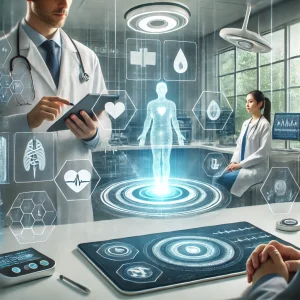
Health technology is transforming the way we deliver care. From AI-powered diagnostics to wearable devices, the potential is breathtaking. But, this incredible power demands an equally profound sense of responsibility. As we embrace these advancements, we must also confront the challenges they bring, balancing innovation, risk, ethics, and workforce transformation to build a future that serves everyone.
Innovation: The Gateway to Better Care
Innovation in health technology isn’t just reshaping healthcare, it’s redefining it. We’re standing at the edge of possibilities that were inconceivable a decade ago. Every breakthrough pushes the boundaries of what’s achievable, offering solutions that save lives, improve patient outcomes, and optimise healthcare delivery. Yet, with every leap forward, we must ensure these advancements are implemented with purpose and clarity.
- AI and Predictive Analytics: What once seemed futuristic is now saving lives. Algorithms are detecting conditions earlier, offering precision in treatment, and reducing human error.
- Connected Care: Wearables and remote monitoring give patients control over their health like never before, creating a bridge between homes and hospitals.
- Telehealth: Breaking down barriers of distance and time, telehealth ensures that care is accessible to those who need it most.
But innovation isn’t the end of the story, it’s just the beginning. Without foresight, rapid advancements can outpace our ability to manage them.
Risk: The Price of Progress
With opportunity comes risk, and health technology is no exception. Every step forward brings a set of challenges that could compromise safety, reliability, or trust. The risks are not always apparent, but their impact can be profound. From navigating complex regulations to protecting systems from cyber threats, healthcare organisations must build a robust framework to address the unseen vulnerabilities of progress.
- Regulation Struggles: Navigating the ever-evolving regulatory landscape can delay breakthroughs, especially for cutting-edge technologies like AI.
- Cybersecurity Threats: As health systems go digital, they become prime targets for cyberattacks. Data breaches aren’t just technical failures, they are breaches of trust.
- Supply Chain Weaknesses: Counterfeit parts, delays, and quality issues can jeopardize the safety and effectiveness of life-saving technologies.
The challenge isn’t avoiding risk, it’s managing it with precision, care, and constant vigilance.
Ethics: Innovation with Integrity
When health technology intersects with human lives, ethics must guide every step. With the power to change lives comes a moral obligation to ensure those changes benefit everyone equitably. Ethical lapses in design, implementation, or data management can undermine public trust and harm those we aim to help. The future of healthcare must be built on principles that prioritise transparency, fairness, and inclusion.
- Fairness in AI: Who benefits from these advancements? Bias in algorithms can exclude underrepresented groups, perpetuating inequities. Ethical AI starts with inclusive data and ends with accountability.
- Privacy in a Digital World: Patients deserve to know how their data is used, and they deserve to trust it’s being protected. Transparent policies and rigorous compliance are non-negotiable.
- Access for All: Health technology must not become a privilege. Whether through affordable solutions or policy advocacy, we must bridge the gap between innovation and inclusivity.
Ethics is not a side conversation, it’s the foundation of trust in healthcare.
The Workforce: Technology’s Human Impact
Health technology isn’t replacing humans, it’s reshaping how we work, collaborate, and care. Every technological shift impacts the people who use it, creating opportunities but also challenges. While automation can simplify tasks and improve efficiency, its success depends on the ability to empower and upskill the workforce, ensuring that technology serves as a tool, not a barrier.
- Evolving Roles: Automation is taking over repetitive tasks, freeing up healthcare professionals to focus on complex, human-centric care.
- Upskilling for the Future: New tools demand new skills. Investing in training is essential.
- Preventing Burnout: Ironically, technology designed to ease workloads can become a source of stress if poorly implemented. Solutions must be intuitive, and support must be unwavering.
Empowering the workforce isn’t just good for morale, it’s essential for delivering care that works.
The Path Forward: Vision and Responsibility
The future of health technology isn’t just about innovation, it’s about intention. Every decision we make today will shape the future of healthcare delivery.
Are we designing solutions that solve real problems or chasing innovation for its own sake?
Are we protecting the vulnerable or creating new barriers? The answers to these questions will determine whether we build a system that is sustainable, equitable, and human-centred.
Health technology has the power to transform lives, but only if we wield it responsibly.
Let’s be the architects of a future where technology enhances care without compromising ethics, trust, or humanity.
